Editor’s note: The following comprises the seventh chapter of Seven Roman Statesmen of the Later Republic, by Sir Charles Oman (published 1902).
VII. Cato
Among all the statesmen with whom we have to deal in this last century of the Roman Republic, there were only two who were unselfish in their aims, looked for no personal profit, and devoted their lives to fighting for their party and their theory of the constitution. These were the two men who, among all the figures of this troubled time, bore the least similarity to each other — Lucius Cornelius Sulla and Marcus Porcius Cato. Save that each was a devoted and disinterested partisan of the Optimate faction, there is absolutely no resemblance between them. What Sulla was we have already seen — an Epicurean to the core, gay, fastidious, taking life easily save in the moments of actual crisis in war or politics, — but when the heat of the fray was upon him capable of systematic cruelty on the widest scale. In all save his reactionary politics and his contempt for monarchy and its trappings, he was a typical Hellenized Roman of the decadence. Cato, on the other hand, was consistent in his reaction; he looked back to old Roman ideals, not merely in politics, but in social manners, dress, bearing, and morals. He is the most complete instance in history of what we may call deliberate archaism, — the careful observance of the customs and views of an extinct generation by a man who was clever enough to see the strangeness of what he was doing, and yet persevered in it. For Cato was no mere Don Quixote, as Mommsen calls him; he did not spend his life in fighting monsters that were unreal, tilting at windmills or at flocks of sheep, or taking innkeepers and milkmaids for castellans and princesses. On the contrary, he knew precisely whom he was fighting with, and what he was fighting for, and used every means that an honourable man might, the most practical and positive no less than those mere constitutional figments in which the Roman mind delighted to deal. Unlike a Don Quixote, he was a thoroughly successful minister of finance, and an excellent and practical soldier. It was only because he fought for an impossible ideal, and because he was foiled by meaner and pettier souls, that he can possibly be called by the mocking name which Mommsen has imposed on him.
M. Cato was the great-grandson of old Cato the censor, a fact which was destined to colour his whole life, for it was his dearest wish to copy in everything, down to tricks of language and dress, a man who had already been noted as somewhat quaint and old-fashioned eighty years before. Hence came his reputation for eccentricity. It was in imitating his ancestor that Cato learnt to despise all fine raiment to such an extent that he habitually dressed in sombre colours. He would sit in the tribunal without his shoes, refused to ride when going about on public missions with his friends, and would not wear a hat even when he was marching across Africa in mid summer. It was probably the example of the elder Cato, too, that induced the younger to show the one concession to the spirit of the times of which he was ever guilty — to study Greek philosophy, and keep at home as a sort of private chaplain a tame philosopher named Athenodorus, whom he had picked up at Ephesus.
It is fortunate that Plutarch has preserved for us a long and detailed life of Cato. It is from anecdotes there related that we are able to make out how a man who was somewhat eccentric in his habits, and somewhat idealistic in his political views, was able to exercise so considerable a sway over the politics of his own day — the sway always exerted by the man who knows his own mind, is perfectly consistent, and is ready at any personal risk, however great, to act in accordance with his conscience. In a time when every one else was peculiarly slack and acquiescent, and given to the grossest opportunism, the man who refused to yield to the stress of affairs or the spirit of the times, and rigidly did his duty, got an influence far beyond that to which his merely intellectual powers entitled him.
Cato was born in B.C. 95. The earliest notices that we have of him show him displaying the same inflexible courage and the same adherence to old views, wrong as well as right, which distinguished him down to his death. His father died when he was very young, and he was brought up by his maternal uncle, the celebrated popular leader Drusus. The house of Drusus was haunted, during his agitation, by the prominent Italians for whom he was working, the men who afterwards led the revolt when he had been murdered. Q. Pompaedius Silo was staying with Drusus when he fell in with the boy Cato, aged five, and his younger half-brother, Servilius Caepio. “Come, my good children, you will help your uncle Drusus, will you not, to assist us poor Italians in getting our freedom,” said the Marsian. Servilius lisped a polite assent; but Cato had already picked up political views, and did not love Italians. He said not a word, and appeared from his silence and his surly looks inclined to deny the request. Pompaedius, half irritated, half in jest, took him to the window and held him out of it by the scruff of his neck, threatening, if he would not promise, to let him drop. This he did in a harsh tone, and at the same time gave him several shakes, as if he were about to let go. But as the child bore this for some time without any marks of concern or fear, Pompaedius set him down, observing, “I verily believe that if this boy were a man, we should not get even one vote among the Roman people.”
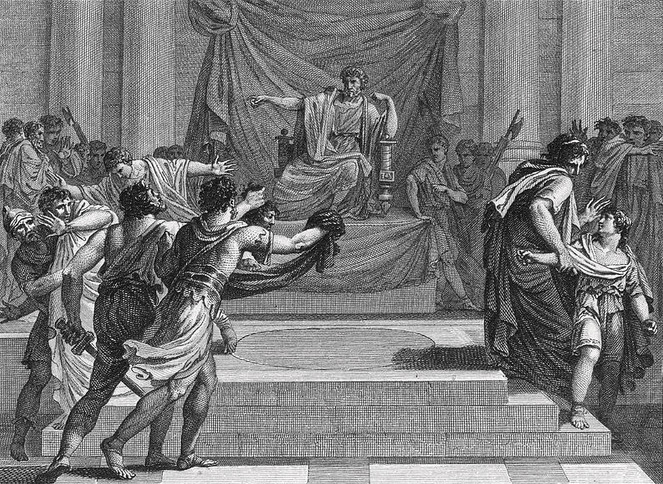
Nine years later, when Cato was fourteen, he was taken by his Optimate relatives to visit Sulla at the time of the proscriptions. While he was waiting with his pedagogue, Sarpedon, in the hall, he saw several delators bring the heads of democratic leaders to the dictator’s house, and receive money for them. At this he was very wroth, and asked his tutor “why somebody does not kill this man.” “Because,” said Sarpedon, “men fear him more than they hate him!” “Then give me a sword,” said Cato, “and I will go in and make away with him, for evidently he is enslaving his country!” So obviously in earnest was he, that he had to be hurried out of the house to prevent his doing something violent, and to be narrowly watched for some time.
Cato first appeared in public life some four or five years after this incident, attending the courts like other young Romans of his age; there he acquired a very good knowledge of law, and taught himself a kind of oratory which, as we are told, differed much from the florid style of Hortensius and the careful elaborateness of Cicero, for “there was neither heat nor artificiality in it — all was rough, strong, and sensible.” Yet he had a turn for natural humour and a clear exposition which served him as well as the studied eloquence of others.
Besides attending in the law-courts, the young Roman had to serve his stipendia in the field. Cato saw his first service in the cohors praetoria of the proconsul Gellius, in the unhappy Servile War with Spartacus. He was noted as one of the few officers in the contemptible army of B.C. 72 who did his work punctually and intelligently. He was offered crowns and promotions by Gellius, but refused them, saying that he had only done his duty and nothing that deserved honour.
When the Servile War ended, he went to Macedonia and served under the proconsul Rubrius in B.C. 68, with the office of military tribune, which gave him a turn in the command of a legion. His troops soon obtained a good name in the province, because, instead of caring for his own comfort like other officers, he insisted on living with the men and taking no better rations than they. On the march, though his freedmen rode on horses, he insisted on going on foot with his soldiers, and on carefully putting himself in the way of every fatigue that came to them. Yet he would not allow undue familiarity, was unhesitating in the application of punishments, and sternly repressed plundering; so that, as Plutarch says, “it was doubted whether his legion was more peaceable or more warlike — more valiant or more well-behaved.” Having now passed twenty-four, the age at which it was possible to stand for the quaestorship, he came back to Rome, but refused to solicit the magistracy till he had spent many months in getting up all the duties and functions of a quaestor, so that he stood a year late for the office.
His year was notable in the history of the quaestorship for the thorough reformation which he made. He found the treasury almost entirely in the hands of the permanent under-secretaries, who had the routine of the business in their hands, and did practically what they liked with the young and inexperienced quaestors, who generally entered the office entirely ignorant of their functions, and were only just beginning to learn them when they found their twelve months at an end. But Cato started with his duties and powers at his finger-ends, and soon detected the permanent clerks committing all sorts of irregularities and illegalities, to their own private profit. He turned out one chief clerk for embezzlement and another for forgery, though it set a hornets’ nest of friends and patrons of the offenders about his ears. Having humbled the secretaries, he took the whole management of the Aerarium into his own hands, his lazy and indifferent colleagues gladly allowing him to bear all the burden. In a short time, it is said, he made the treasury much more respectable than the Senate, and his quaestorship more memorable than most consulates. For he recovered an immense amount of outstanding debts owed by men of mark, whom his predecessor had not dared to press, and at the same time paid off a number of bills owed by the state to poor men, which the unhappy creditors had long despaired of recovering. One extra ordinary instance of his courage has been preserved. Finding a list of Sulla’s delators and of the sums they had been paid for the murders they had committed, he compelled all the survivors to pay back the blood-money, because (as he said) it had been an illegal disbursement, never justified by any decree of the people.

When his year of office was running out, Cato had a complete chart and analysis of the public revenues for the last ten years made out, at the personal expense to himself of five talents. He kept it, and it proved invaluable to future quaestors, who always came to consult him when in difficulties, and to get his lights on the meaning of difficult points in the annual balance-sheet of the Republic. At thirty-one, then, Cato had a fair military record, and was acknowledged to be the best financial expert in the Senate, a reputation which he preserved till his death.
He would seem to have intended to spend some time in getting up the duties of the higher offices of state, but was suddenly called into activity by the Catilinarian conspiracy. He is generally remembered for the support that he gave to Cicero through all the troubles of B.C. 63. Yet curiously enough he was on one occasion brought into violent collision with the consul. He prosecuted Muraena, the Optimate consul-elect for B.C. 62, for bribery at the elections, and when he came into the court found Cicero opposing him as the defendant’s advocate. The offence had been a gross one, and the consul had nothing better to do in the way of defence than to follow the good old forensic maxim, “If you have no case, abuse the plaintiff’s attorney.” Accordingly he grew offensively personal, jeering at Stoics, and hinting that Cato’s love of purity and legality might be in place in some ideal republic, but not in Rome, till he set the jury in a roar. Cato was defeated, but contented himself with remarking that “Rome had a very facetious consul.” He took no offence at the ridicule that had been poured on him, and remained a consistent supporter of Cicero.

The first occasion on which we find Cato exercising a really great influence on politics was at the celebrated debate on the execution of Lentulus and Cethegus and the other Catilinarian conspirators. Speaking as a very junior senator towards the end of the meeting, he completely undid Caesar’s feat of inclining the Senate to change the vote from death to banishment, though Caesar had been so effective that he had actually induced Silanus (the proposer of the death penalty) to change round and accept the milder alternative. The speech which Cato actually uttered is certainly not that given by Sallust, who, after the manner of other ancient historians, has constructed an oration out of his inner consciousness. For the words which he puts in Cato’s mouth do not at all agree with the notes in Plutarch, and the latter implies that he had seen the actual oration, which was taken down at the time by Cicero’s shorthand writers. The chief point in Plutarch’s version is that Cato attacked Caesar by name, charged him with being concerned in Catiline’s designs for subverting the Republic, and said that he might think himself fortunate for not being on trial along with Cethegus and his crew. The unscrupulous Sallust evades these points, being evidently set on keeping out of sight anything that might redound to the discredit of his patron Caesar.
Cato’s activity was strenuously displayed all through the year of the conspiracy, but in that which followed he was even more prominently before the eyes of the public. In the autumn, when he thought that he might snatch a moment’s leisure, he had set out for his estates in Lucania. But on the way he met Metellus Nepos, who was coming to Rome from the East as Pompey’s political agent. Hearing that Nepos was about to stand for the tribunate, in order that he might lay before the people his patron’s demands, Cato grew excited. “This is no time for rural delights,” he cried, and turned his face back towards the city. For, like so many other Romans of that day, he was firmly convinced that Pompey was aiming at a tyranny, and that his return to the city would be the signal for a coup d’état. Accordingly he conceived it his duty to endeavour to hold Metellus in check, and stood against him at the tribunicial elections. Both were successful, and the year B.C. 62 was made lively by their interminable quarrels.
Their main dispute was on the occasion when Metellus made his very unnecessary proposal that Pompey should be called home from the East, to quench the embers of the Catilinarian rising, a project which he must have made on his own inspiration and without his patron’s knowledge. Since Antonius had crushed the insurgents at Pistoria, there was no serious work for Pompey to do. The proposal seemed to Cato entirely sinister; it confirmed the worst suspicions that he had nourished concerning Nepos and his employer. “The project was absurd,” he said, “but Metellus’s stupidity was so great that it sometimes became formidable.” Accordingly, he determined to use his tribunicial veto to the uttermost. “While I live,” he was heard to say, “Pompey shall never enter armed into the city.” This determination led him into the first of those riotous scenes in the Assembly of which he was so often to be the centre during the next twelve years.
On the day on which Metellus proposed to introduce his bill, he packed the Forum with gladiators and hired bravos, and enlisted the support of Caesar, whose talents for mob-management were considered to be unrivalled, till Clodius arose and carried the art one stage farther. It appears strange to find Caesar aiding a partisan of Pompey at this date. Apparently he did so from sheer mischief, one of his reasons being that he was disgusted with Cato for foiling him at the trial of Lentulus and Cethegus; the other, that he wished to embroil Pompey with the Optimates. As a leader of the Democratic party, he did not really wish to see the army of the East and its general transferred to Italy. But it would profit the populares if the Pompeians could be induced to ask for over-great and unconstitutional powers for their chief; and it would be no less desirable to set Pompeians and Optimates at daggers drawn, by inducing the Senate to commit themselves to open antagonism to the measures proposed by Nepos. Accordingly Caesar lent himself as a supporter to the unwise demands which the latter was making.
On the day of assembly the mob which Metellus and Caesar had brought with them looked so threatening, that Cato’s friends besought him not to risk himself among them. But the element of personal safety never entered into his calculations. He ploughed his way through the tumultuous crowd, and found Caesar and Nepos seated side by side on the rostra. At once he plumped himself down between them ; it looked rude, but it had the effectual result of preventing them from communicating easily with each other. When Nepos began to read his bill, Cato rose and interposed his veto. Encouraged by the shouts of his partisans, Pompey’s friend ignored the interruption and continued to recite his preamble. Thereupon his colleague suddenly snatched the document from his hand and tore it up. Nothing daunted, Metellus went on with his clauses, speaking from memory. This was too much for Cato, who, assisted by another Optimate tribune, one Minucius Thermus, seized the orator, pulled him back to his seat, and laid his hands on his mouth. Nepos, as might have been expected, shouted to his friends that violence was being used against his sacrosanct person. The mob stormed the platform, and Cato was assailed with sticks and stones. His life was only saved by the consul Muraena, who covered him with his gown, and hurried him into a neighbouring temple. Seeing the coast clear and his adversary driven off, Nepos began once more to recite his bill; but he had not got far when Cato, much battered though he was, emerged from his place of shelter with a few friends at his heels, and charged the rostra from the rear. The whole meeting broke up into a riot, order could not be restored, and the bill was never carried. Probably Caesar was as pleased at the fiasco as was Cato himself, for he can never have intended that Pompey should really be recalled. He had merely wished to provoke bad blood between Pompeians and Optimates, and in this he had certainly succeeded.
Metellus went back to the East to report his failure to his patron, after having denounced Cato as an enemy of his country and a conspirator against its most worthy son — accusations which not even the most fanatical democrat or Pompeian could take seriously.
When at last Pompey came home in person, Cato was still in the same mind concerning him; he was fully convinced that he was aiming at despotic power, and never attempted to separate the foolish projects of Nepos from the very reasonable requests which Pompey himself laid before the Senate and people. Considering the extreme moderation of the general’s demands, there was no reason why he and the Senate should not have come to an agreement, and have united to keep down the Democrats. The two chief hindrances in the way were the foolish vanity of Cicero, whose conduct we have already had occasion to relate, and Cato’s unconquerable suspicion of all that Pompey said and did. The general endeavoured to conciliate him by every means in his power, went out of his way to explain his harmless intentions, and even requested the hand of Cato’s niece, Servilia, for his son Gnaeus, as a token of reconciliation. Cato was utterly unconvinced, imagined that an attempt was being made to bribe him with a great alliance, and sent away the friend who brought Pompey’s message with the reply that “he was not to be caught with a female snare.”
So far, indeed, was he from being conciliated, that it was undoubtedly he, more than any other single person, who made peace between Pompey and the Senate impossible, and ultimately drove the much-provoked general into the arms of Crassus and Caesar. It was Cato who induced the Senate to refuse to ratify Pompey’s treaties and grants in Asia: the plea which he used was that Lucullus had also made arrangements with the Asiatic states, some of which conflicted with those of his successor. In justice to Lucullus and those with whom he had negotiated, Cato declared that it was necessary not to ratify Pompey’s doings en bloc, but to go through each document separately, after comparing it with the previous obligations contracted by his predecessor. This was rational enough in itself, but the result was unfortunate. Convinced at last that he would never get decent treatment from the Senate, the outraged general was forced into his alliance with the Democrats. There is something in Plutarch’s conclusion that, judging by the event, Cato was in the wrong; though much was to be said in favour of discussing the treaties separately, yet the result was that, by forcing Pompey to league himself with Caesar, he indirectly brought about the ruin of the Republic.
Cato at this time made himself no less odious to Cicero than to Pompey, by breaking up the Concordia Ordinum, — the alliance of Senate and Equites against the anarchic forces in the state, — which had been brought about by the Catilinarian insurrection. The consul of B.C. 63 had enlisted all men of property in defence of the existing constitution by the lurid account which he gave of the conspiracy and its ends. As long as the Equites were kept estranged from their old leader Crassus, by memories of the plot, the Democratic party was shorn of one of its strongest elements. But at last there arose a question on which the interest of the state and that of the Equestrian Order clashed. The great syndicate of capitalists which had contracted to raise the tithes of Asia found that it was making a worse bargain than it had expected, and came to the Senate with the request that the terms of the agreement might be varied in its favour. Cicero admitted in private that such a demand was impudent; they had entered into the contract with their eyes open, and it was by no means proved that they were making an actual loss. But the whole Equestrian Order was directly or indirectly interested in the business, and the orator was so convinced of the necessity of keeping them allied to the Senate, that he was prepared to support them. Not so Cato: he had gone into the figures, and had come to the conclusion that there was no rational necessity for varying the contract. Why should disappointed speculators be compensated for receiving a less percentage of profit than they had calculated upon obtaining? He made out such a clear case against the proposal that it was rejected. Cicero was disgusted. “Cato,” he complained, “speaks as if he was dealing with the ideal commonwealth of Plato, not with our corrupt and decadent Rome.” Morally, he was right; practically, he caused the resentful Equites to quit their alliance with the Optimates, and to turn once more to their old friend Crassus [June B.C. 60].
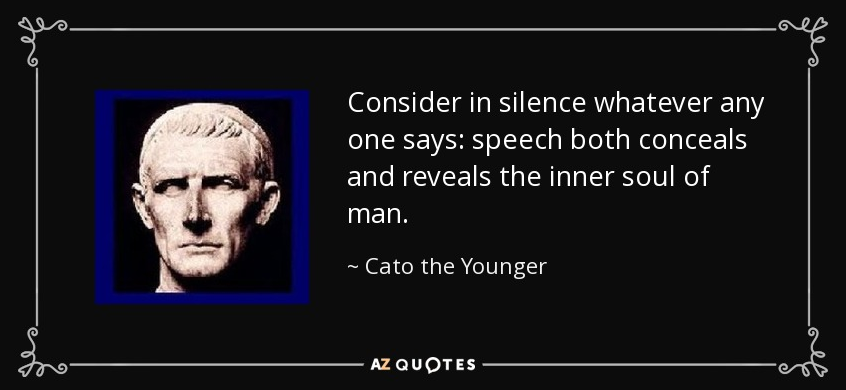
That by estranging the actual or possible allies of the Senate he was dooming his party to destruction, was no concern to Cato. His principle was that a loyal citizen must not do evil that good may come, that anything is better than opportunism, and that it is far more important to have a clear conscience than to score a temporary political success. If evil days were at hand, he was perfectly prepared to fight, by every device that an honest man might use; but he would not buy support from any quarter by what he considered corrupt concessions.
The crisis was not very long delayed; when Caesar came back from Spain in the summer of B.C. 60, and the disheartened Pompey consented to join him and Crassus in forming the “First Triumvirate,” Cato took arms at once. His first achievement was to “talk out” Caesar’s demand for a triumph. In order to sue for the consulship for the next year the returning general was bound to enter Rome by a fixed day. In order to triumph he had to obtain the Senate’s approval before he passed the gates. There happened to be only one meeting at which the motion could be taken into consideration. When it came, Cato beat the record of the ancient world by making a speech which lasted the whole day. It was not a good speech, as even his friends allowed, but it served the desired purpose. Caesar, more set on obtaining the consulship than the triumph, was obliged to quit his legions and enter the city in order to begin his canvass. He was disgusted with the obstructionist orator, and never forgave him. Of all the opponents with whom he clashed during his stormy career, Cato was the only one for whom he nourished a real dislike. He showed it by publishing a very bitter and unfair satire, the “Anti-Cato,” against his memory, after he had fallen in the civil war, a deed that contrasts strangely with his usual magnanimity to his adversaries.
After the turbulent consulship of Caesar and Bibulus began, on 1st January B.C. 59, Cato had plenty of occupation provided for him. When the Julian Laws, which were to consolidate the triumvirate, began to be brought forward, he came down to the Forum to oppose every one of them. At the first great riot, when Caesar illegally refused to listen to his colleague’s veto, and went on with his legislative proposals in face of every constitutional hindrance, we find Cato at the side of Bibulus, enduring in his company the storm of stones and blows. When at last the Democrats drove them out of the assembly, it was Cato who brought up the rear, refusing to hurry as he went, and turning every now and then to tell the unheeding rabble of pursuers that they were lunatics as well as bad citizens. When Bibulus had retired to the safety of his house, and contented himself with putting up a daily notice that no legal meetings of the Comitia could be held, as he was intending to ” observe the heavens,” Cato sought no similar shelter. He came down to oppose the law for distributing the Campanian lands, and spoke so bitterly that Caesar had him dragged from the rostrum and sent to prison, though he soon allowed him to be released by a friendly tribune. When the question of the Asiatic tax-farmers was brought up in the Senate, he tried to “talk out ” the proposal, as he had talked out the question of Caesar’s triumph seven months before. But the consul had him stopped in the midst of his harangue, and no one dared to protest. At the most important assembly of the year, that in which the disreputable tribune Vatinius carried the law which made Caesar governor of Gaul, Cato again came down to protest. He told the citizens that “they were voting a tyrant into the citadel” when they gave the triumvir the all-important Cisalpine province and the legions that lay in it. But it was to no purpose: Cato had liberated his conscience by making his protest, but he had no other consolation. All that he had succeeded in accomplishing was to make Caesar use illegal violence in a way that in the eyes of strict constitutionalists vitiated all his legislation. But strict constitutionalists were a negligable quantity at Rome in those unhappy days.
It may have been some consolation to Cato to find that he had at least succeeded in provoking his enemies to the point of expelling him from Rome. In B.C. 58 they let loose upon him the famous demagogue Clodius, then in the first energy of his tribunicial year. The annexation of Cyprus, a very unjust and disreputable piece of work, had just been determined upon. Clodius announced that as there were tempting opportunities for plunder in King Ptolemy’s treasury, the most honest man in Rome had better be sent to conduct the business. Cato replied that he had no intention of touching such an iniquitous affair, and should not accept any such post. “It is not your pleasure to go,” answered the tribune, “but it is my pleasure that you should be sent.” Thereupon he procured a decree which appointed Cato to take charge of Cyprus and its annexation, and also to reconcile two factions at Byzantium which were engaged in civil war. He was to be kept out of Rome as long as the triumvirs and their agent thought necessary. To show that he was in disgrace, he was given neither a single soldier, a ship, nor a supply of money, and he had assigned to help him only two secretaries, one of whom was a notorious thief, and the other a client of Clodius — which came to much the same thing.

When practical work had to be done, Cato was always at his best, and this unsought-for mission, which took him away from Home during the time of Cicero’s banishment, and of many other troubles, enabled him to do the state good service. He reconciled the Byzantines with no difficulty: the Cypriot matter turned out heart-rending to an honest man, but not otherwise difficult. The unfortunate king committed suicide when he heard that he was to be evicted, though Cato tried to smooth matters for him, by promising him a competent maintenance[1] and the important post of high-priest of the Paphian temple, the chief sanctuary of the island. Ptolemy being removed, there was no hindrance to taking possession of his whole treasure, which amounted to the great sum of 7000 talents. The removal of such a mass of bullion to Rome was no light matter: fearing shipwreck, as we are told, Cato took the curious precaution of sealing up precisely two talents and 500 drachmae in each of several thousand vases. To the lid of each vase he fastened an immensely long cord, with a large cork buoy at the end, his idea being that if the ships miscarried the buoys would float on the surface of the sea, and guide salvage work. What was to be done if the misadventure took place in really deep water, Plutarch does not tell us.
Cato came back to Rome late in the summer of B.C. 56, in time to be involved in all the troubles which were caused by the renewal of the triumvirate at Lucca, and the determination of its members that Pompey and Crassus should be made consuls for 55. At first Cato had some personal troubles of his own to distract him. His old enemy Clodius was still reigning over the streets of Rome in all his glory, and thought that it would be a humorous and appropriate thing to indict Cato for embezzlement of some of that very Cypriot treasure over which the latter had taken so much trouble. The charge was too gross, and Cato easily got off, after making his famous bon mot that “what greater disgrace can the age see than Clodius as the accuser and Cato as the accused in a trial for embezzlement?” Yet, curiously enough, Cato was found at the same moment opposing a motion in the Senate to declare the acts of Clodius’s tribunate illegal. It had occurred to Cicero, some time after his return from banishment, that the best way to get rid of the slur on himself caused by the decree that the demagogue had passed against him, would be to procure a declaration that the latter had never been legally elected tribune. To stand for the office Clodius had been forced to get himself adopted as a Plebeian, and his adoption had been carried out with the most flagrant disregard of legal formalities. Cato opposed this raking up of events now three years old, by pointing out that many accomplished facts depended for their legality on Clodius having been duly elected; among others, his own commission to Cyprus. If Clodius was no tribune, then he had been no commissioner, and all his doings in Cyprus and Byzantium were vitiated. This settled the matter, and Cicero’s ingenious device was rejected — a result which made him as bitterly angry with Cato, as he had been once before over the breaking up of the Concordia Ordinum, and as he was to be once again over the matter of his triumph for his military exploits in Cilicia.
It is to the same year, B.C. 56, that belongs the most extraordinary, and to our eyes most objectionable, of the incidents of Cato’s private life. Plutarch wrongly gives it as having happened in 63, which the ages of the persons concerned makes impossible. He had married as his second wife Marcia, daughter of the consular Marcius Philippus; she was still a young woman, had borne him three children, and was a person of excellent character. Hortensius, a particular friend of Cato, came to him with the request, which he allowed was an unusual one, but which he trusted would not offend Cato, that he would kindly divorce his wife and allow himself (Hortensius) to marry her. For although Cato was quite satisfied with her, he thought that he himself was more interested in the lady. “Observing the vehemence of Hortensius,” says Plutarch, “Cato did not absolutely refuse him, but said that it was necessary to consult his wife and her father Philippus. Finding them not unwilling, he said that his private inclination should not stand in the way.” Accordingly he divorced Marcia, and she was married to Hortensius in his presence and with his consent — surely the most extraordinary instance of altruism known. For that, Cato was consulting in philosophic guise “the greatest happiness of the greatest number” is shown by the fact that when Hortensius died, six years later, he at once remarried Marcia, and lived with her again till death parted them. It was a strange example of Roman views and Roman morals in the aspect which appears most unlovely to us.
Cato’s next field-day was during the consular elections of B.C. 55. The Optimates had been thoroughly cowed by the news of the conference at Lucca, and the assurance that Caesar, Pompey, and Crassus were firm friends again. Accordingly, when Crassus and Pompey announced their intention of standing together for the consulship, no one had the courage to enter the field against them. Cato was much enraged at this, and went about trying to get one man after another to stand as an Optimate competitor. At last he prevailed on Lucius Domitius, who had married his sister, to put himself in the way of honour and danger. Seeing Domitius canvassing assiduously, the friends of the triumvirs determined to use violence, and on the day of the election prepared gangs of Clodius’s ruffians to block the polling-places at daybreak. But Cato and Domitius went down to the Campus Martius with torches at midnight to secure a good place. At dawn arrived the first gangs of the triumvirs’ myrmidons, who killed Domitius’ torch-bearer and chased away his and Cato’s clients. The unwilling candidate would have fled, but Cato, though badly wounded by a dagger-thrust in the arm, “still kept Domitius on the spot, adjuring him not to desert the cause of the Republic as long as he had life in him.” But his brother-in-law’s firmness broke down; unable to stand the stress, he finally retired, and Pompey and Crassus were elected.
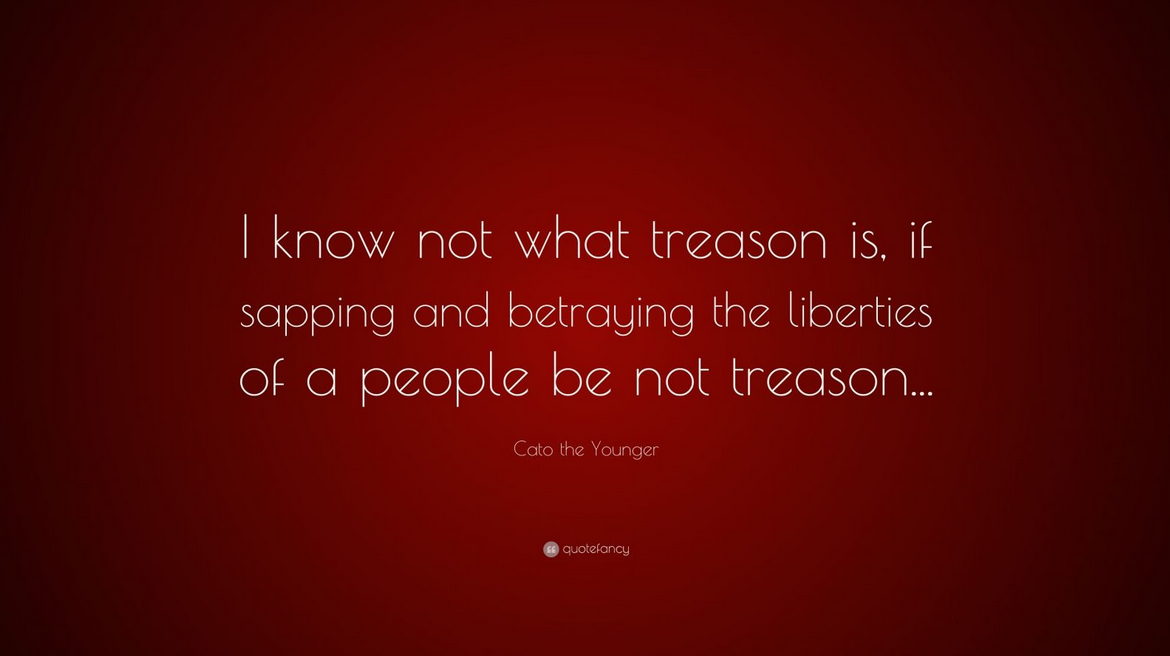
Cato then proclaimed that if other men fled he would not, and announced himself as a candidate for the praetorship, intending thus to secure himself thereby the sacrosanct position of a magistrate, and (as Plutarch quotes him) “a kind of fort from which he should be able to make sorties against the consuls.” He failed, naturally, as he scorned to use either bribery or intimidation, both of which were lavishly employed against him. It was therefore only as a private person that he was able to speak against the Trebonian Law which gave Pompey Spain and an army, and Crassus Syria and an army. When the bill was brought forward, Cato got permission from a friendly tribune to speak, but when he had already talked for two hours, “with many repetitions and many predictions of evil,” Trebonius got angry and bade his apparitors take him down from the rostrum. Yet, standing below among the people, he continued his speech, which so enraged Trebonius that he had him driven out of the Forum. But in a few minutes Cato was back and climbing up the rostra again, whereupon Trebonius, thoroughly roused, had him haled to prison. He had wasted the day, but on the succeeding one the triumvirs’ men blockaded the tribune Aquilius (who was going to veto the law) in the Senate-house by force of arms, cleared the partisans of the Optimates out of the Forum, and badly mauled Cato, who gravely kept asserting that he heard thunder on the left,[2] and that the Comitia ought therefore to be broken up.
It was in the next year that Cato made his celebrated declaration that he intended to prosecute Caesar, the moment that his proconsulate had run out, and he had become once more a private person. The cause was his treacherous dealing with the Usipetes and Tencteri. After concluding a peace with them, and seeing them start homewards to cross the Rhine, he had fallen upon them, alleging a breach of the convention on their part, and had slain more than 430,000 men, women, and children, according to his own version [B.C. 55]. Even as told in the De Bella Gallico the story has a very sinister look; there seems no doubt that Caesar went very near the edge of treachery, if he did not cross it. Cato was so indignant at the transaction, that he gave notice that he would move that Caesar should be put in chains at the expiration of his command, and surrendered to the surviving Usipetes, as Mancinus had been surrendered to the Numantines, or Poplilius to the Samnites after the Caudine Forks. Caesar used this threat of Cato’s to great effect as a reason why he must continue to hold perpetual office. To avoid such a danger he wished to be allowed to sue for the consulship of B.C. 48 in his absence, before his existing commission in Gaul should run out. Of course he was insincere in pretending that he would be in personal danger if he returned to Rome. There was not much chance that he would be condemned either by the Assembly or by a Special Commission. The former he commanded, the latter he would have bribed. Cato was alone, and it would have required a whole Senate like himself to have made such an attack upon Rome’s greatest general.
In the following year, when Crassus had gone off to Syria, and Pompey was beginning to show some signs of slackening in his friendship for Caesar, Cato stood for the praetorship again, and we learn to our surprise that he was successful. The lustre of an exemplary tenure of office was somewhat dimmed in the eyes of the public, we are told, by the fact that Cato showed his imitation of his great-grandfather rather too grotesquely, by often going to sit on the praetorial bench without his robe or his shoes, when he had to pass sentence on persons of high importance. We know little of his doings except that, as a testimony to his integrity, at the next praetorial elections all the candidates agreed to avoid bribery and to deposit 500 sertertia each with Cato, he undertaking to declare forfeit the deposit of any one of them whom he should consider to have acted unfairly in the canvass. One man was detected while distributing bribes: Cato therefore declared his deposit forfeited, and offered a share of it to each of the other candidates. But fellow-feeling, or the consciousness that their own private doings would not bear inspection, seems to have swayed them all, for each sent back what he had received to the convicted man. This curious transaction only took place after a very stormy scene in the Comitia: the mob disliked any attempt to put down corruption, and when they understood Cato’s line of action pelted him with stones, so that all who were about him fled, and he was left alone on the rostra. “Yet, standing there unmoved, with a firm and steady aspect, he finally hushed the clamour of the mob, and demonstrated the righteousness of his proceedings” [B.C. 54].

Another curious incident from the year in which Cato enjoyed the praetorship has been preserved. He came down to support his friend Favonius, who was standing for the aedileship of the next year. When the votes were counted, it seemed that Favonius had been beaten; but Cato got permission to examine the tablets, and found so many obviously written by the same hand and foisted into the boxes by fraud, that he got the election quashed by the tribunes. At a second ballot his friend was returned; as a mark of his esteem he entrusted the management of the theatrical shows which he exhibited to the people to Cato — a strange choice considering his views and habits. Cato did not decline the task, but managed the details of the entertainment according to his own ideas of the becoming. He gave the actors crowns of wild olive instead of gold (one trusts that he remembered the difference when settling their salaries), and instead of showy and expensive presents distributed small and useful donatives. We are told that they included bundles of leeks, radishes, lettuce, and parsley, little bottles of wine, joints of pork, cucumbers, and faggots of wood. The theatre after the distribution must have looked like the shop of a general dealer; but we are told that the people were highly amused, and deserted a great show which Curio was giving on the same day, in order to see Cato acting as master of the ceremonies.
In the next year, when Pompey was obviously becoming estranged from Caesar, and inclining towards the Optimates, Cato ventured to stand for the consulship. But his rivals, Sulpicius and Marcellus, bribed heavily, while he offered nothing, and did not even go out of his way to canvass. He expected to be beaten, and was not disappointed; on the day of the poll he was playing ball when the return was made. The messenger with the unfavourable news reached him in the middle of a game, which he quietly finished, and then took a walk round the Forum without shoes or toga to show his equanimity [B.C. 52].
In B.C. 52-51 we find Cato for the first time in friendly relations with Pompey. He had at last convinced himself that nothing was to be feared from that quarter, and that Caesar was the real danger to the Republic. Accordingly he turned to exhorting Pompey to beware of his father-in-law. “You took him upon your shoulders eight years ago,” he said, “and now you begin to find him heavy. You can neither support his weight nor cast him off; probably you will both fall together, and in your fall crush the Republic.” In B.C. 50 Cato was the soul of the party which had made up its mind that war with Caesar was inevitable, and that it was necessary to take the offensive against him. It was he who urged that the great proconsul should be given a successor in each of his provinces as soon as possible, and that all his many proposals for a compromise should be rejected. Pompey’s vacillation drove him wild, and when at last the news came that Caesar had crossed the Rubicon before any preparation to resist him had been made, he could not restrain himself. At the next meeting of the Senate he spoke in the character of a despised and neglected prophet, whose predictions had at last come true. If the Fathers had listened to him during the last ten years, he said, they would neither be living in deadly fear of the power of one man — Caesar — nor putting their sole hope of defence in the strength of another man — Pompey. Nevertheless he supported the decree which placed the conduct of the war in the hands of the latter, using the scornful argument that “the authors of great evils should best know how they were to be cured.”
When various senators were given charge of the different regions of the empire, for the purpose of raising troops against Caesar, Sicily was assigned to Cato. He went to Syracuse in deep despondency, but determined to do his duty. From the day when the war broke out he never cut his hair, nor shaved his beard, nor wore a garland; however the conflict might turn out, it was a grief to him that he had to contend with Roman citizens. In Sicily he had not long to stay, for Caesar’s general Pollio crossed into the island before he could assemble a respectable force, and he was forced to fly to Pompey in Epirus.
In the faction-ridden camp of the Optimates he was a useful if not a cheerful figure. It is true that he offended the more violent men by insisting that Roman citizens must not be put to death except in battle, and that there must be no proscription if they returned to Italy victorious. Nor did he conciliate Pompey when he bade him always to remember that he obeyed him as his military commander, not as his party chief. But he was so vigorous and untiring in his work of organising the new legions, and proved so capable of inspiring others with his own fire, that he was perhaps the most valuable officer in the army. His harangue to his own division before the battle of Dyrrhachium was long remembered. Abandoning his usual reserve, as Plutarch tells us, he spoke to them of liberty and virtue, of death and glory, with such impassioned eloquence, that they swore to follow wherever he would lead, and kept their promise. In the ensuing battle they did their best, drove back Caesar’s veterans, and broke the lines of investment. If Pompey had known how to utilise a success as well as he knew how to win it, the day might have been fatal to the enemy.
It is said that for a moment there had been a chance that Cato might have been given the command of the whole Optimate fleet, which Bibulus, who was made admiral in his stead, so grievously mismanaged. But Pompey on reflection came to the conclusion, that though he would be an energetic lieutenant while the war lasted, he would be a very uncomfortable colleague if it came to a successful end, for he would certainly have used the naval force as a counterpoise to the army. Cato’s old suspicions of the ex-triumvir would certainly have revived, and friction would have been inevitable. Yet it would surely have been better to have chanced future troubles, and to have utilised for the present the services of a strenuous and capable officer. To give Bibulus or Octavius the fleet was to risk everything. Indeed, the failure of the whole campaign may be traced back to the fact that the inefficient blockade kept up by the Pompeian admirals allowed Caesar’s reinforcements to get across to Epirus. If they had never been allowed to sail, the Optimates must have crushed their opponents by mere force of numbers.
When Caesar struck inland, and Pompey was compelled to change the theatre of operations to Thessaly, he left Cato in charge of his base-camp, his treasure, and his naval stores at Dyrrhachium, giving him fifteen cohorts for their guard. This important charge kept him from being present at Pharsalus; if he had been there, it is probable that he would not have survived the defeat, for it is certain that he would not have been the man either to fly or to surrender. As it was, he found himself at the head of the only considerable fraction of the Optimate army which had escaped destruction. He crossed over with his fifteen cohorts to Corcyra, where he joined the fleet. A powerful armament was thus at his disposal, but he would not take up the supreme command, for he had discovered that there was a senior magistrate on the spot. This was Cicero, to whom he insisted on turning over the charge of ships and men. The unfortunate orator was placed in a most uncomfortable position, for he intended to do anything rather than fight, and was already meditating how best he might make his peace with Caesar. He refused to take over the command, with every sign of alarm, and so provoked the young Gnaeus Pompeius that he purposed to have him put to death as a traitor. Cato, though much disgusted with him, succeeded in preserving his life, and managed that he should escape by night to Brundisium, where he made his submission to the enemy.
Nothing now remained save to take the relics of the army of Epirus to the spot where they could be most useful. Cato resolved to join Metellus Scipio, and King Juba in Africa, the only province where a considerable force was still in arms for the Republic. Accordingly he crossed the sea, and landed at Cyrene with 10,000 men. He took them by a long march, around the head of the Syrtes, to place them at Scipio’s disposition. Refusing either to use a horse or to shield his head by a hat from the African sun, he marched for seven days on foot through the Tripolitan sands at the head of his troops, and finally reached the African border.
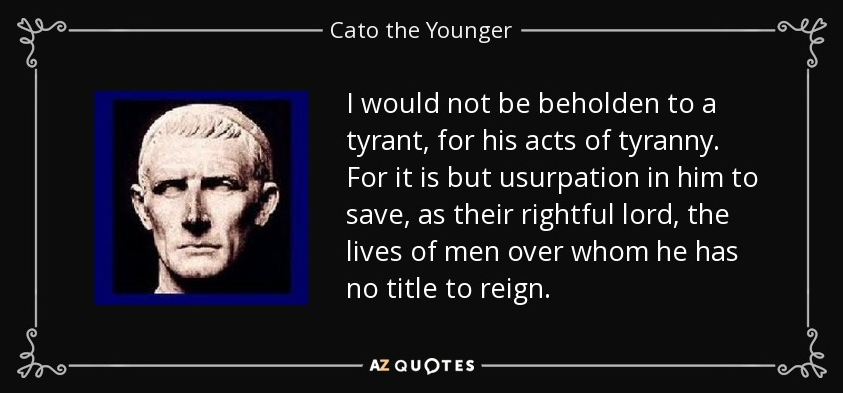
The whole Optimate army, and Scipio himself, wished that Cato should take command of the province. But constitutional etiquette, as at Corcyra, was in the way. “We are fighting Caesar,” said he, “because he has broken the laws; it would not be right that I should break them too, by assuming superior authority over the head of a proconsul, when I am only a propraetor.” So Scipio, though known by all to be rash and incapable, kept the charge of the army, while Cato was placed in command of the base-camp at Utica. He fortified the place with great care, and collected vast magazines in it for the use of the field-army. His advice to the proconsul was to avoid a pitched battle at all costs, and to wear down Caesar’s army by the African sun and the harassing assaults of Juba’s Numidian cavalry.
But, as might have been foreseen, the stupid proconsul soon allowed himself to be lured into a battle, and the disaster of Thapsus followed. Once more Cato found himself at the head of the mere wreck of an army, and encompassed with a campful of dispirited politicians who were thinking of making their submission to Caesar. At first he resolved to resist to the end, and made every preparation to fight; but he found that the Roman residents of Utica were intriguing to surrender the place to the enemy, while the troops refused to shut themselves up in a city where there was a large population which might turn against them and admit Caesar. Some of the soldiery informed Cato that they would only stand a siege if they were first allowed to put to death or expel every one whom they suspected of treachery within the walls. But he refused to listen to any proposals for a massacre, whereupon they told him that they should march off into the interior, and leave him to shift for himself.
Abandoned by his troops, and quite conscious that the Utican senate was prepared to admit Caesar the moment that he appeared, Cato thought that he had reached the limits of his responsibility. It was still open to him to escape by sea, and join the last desperate levies which the two young Pompeys were collecting in Baetica. But it seemed to him that the cause of the Republic was so hopelessly lost that any further struggle was useless. He knew the two reckless and violent young men in Spain too well to believe that if, by some strange turn of luck, they were to beat off Caesar, they would ever restore the old constitution of the state. Rome would merely get two tyrants instead of one ; it was not for him to protract the war for such an end. All that remained was that he should seek the last refuge of the just man in the day of hopeless adversity, a voluntary death. The Stoic creed, of which he had always been such a firm adherent, supplied him with the advice which was necessary in such a crisis. To fight was useless, perhaps even harmful; to surrender was dishonourable; it only remained to die.
There was still a day or more at his disposition before Caesar could arrive, and this time he devoted to setting his house in order. He procured shipping for all those who chose to fly to Spain, and saw them quit the harbour. There remained with him none save his young son, his friend Statilius, and two philosophers, Apollonides the Stoic and Demetrius the Peripatetic, who had accompanied him from Cyprus. After bathing he went to dinner; he had invited the magistrates of Utica to join him, though he knew that they intended to surrender to Caesar next day. Throughout the meal he showed himself cheerful beyond his wont, and led the conversation through many fields of philosophy. In particular, he dwelt long on the old Stoic paradox that “the good man only is free, the bad man, even in success, a slave.” It was quite true, he maintained: he himself had done his duty, and was therefore happy. Caesar had become the enemy of his country, and so was the most miserable of all men. He looked upon himself as the victor, and the dictator as the vanquished. To his son he left one legacy of advice — to keep clear of politics. In the Rome of the immediate future, he said, “you can not fill any place in a way that would be worthy of your father; to do it otherwise would be unworthy of yourself.”
After the dinner was over, he took a short walk in the dark with his son and his friends, and retired to his chamber. Then he said farewell to all in such words that none could fail to guess his purpose. When left alone, he lay down on his bed and began to read Plato concerning the Immortality of the Soul; but he had not gone far before he missed his sword from its usual peg at the head of his couch. His son had removed it when he guessed his father’s intent. With some displeasure he summoned the young man, and asked him whether he desired to surrender him to Caesar. If this was his wish, why had he not bound him and fettered his hands, for a brave man did not need a sword; if that was missing, there were other, if more painful, ways to die. Then, turning to the two philosophers, he inquired whether they thought it likely that they could convince him that it would be wise or honourable to submit to Caesar. If not, what course did they intend to propose to him?
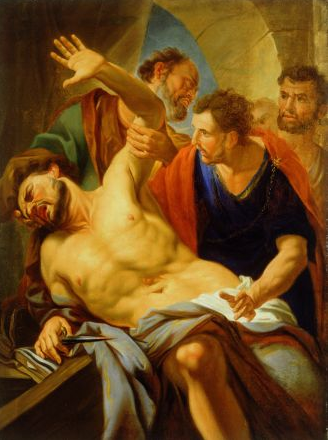
The son and the philosophers withdrew in tears, and seeing that nothing else was left, sent in the sword by the hands of a slave. Cato tried its edge. “Now, at least, I am master of myself,” he said ; and, lying down again, he twice read through the book on which he had been intent. Then he lay down for a short snatch of slumber; but at dawn he woke, and without further lingering stabbed himself as deeply as he could below the right breast. The noise of his fall roused his friends, who had been listening all night for some such noise. With cruel kindness they bandaged his wound, which was not necessarily mortal, and laid him on his couch again. But the moment that he came to himself he pulled away the bandages, tore open the hurt, and died in a few minutes.
Caesar came up next day. At first he tried to play the magnanimous part: “How could Cato envy me the glory of pardoning him and saving his life?” he cried. But his real feelings for the one man whom he could not bend were shown when, not long afterwards, he published his satire, the “Anti-Cato.” In this discreditable work he heaped together all the stories, true or untrue, which placed his enemy in a ludicrous light: he did not shrink from saying that Cato had passed the ashes of his brother’s funeral pyre through a sieve, in search of melted gold, and that he had lent his wife to Hortensius for valuable consideration. But such slanders did more harm to the writer than to the subject of his libel.
Caesar’s pamphlet has long been forgotten, and Cato’s life, in spite of the sneers of Mommsen and other blind worshippers of the dictator, will long continue to appeal to all who love an honest man. We no longer write tragedies to his glory; we grant that he was a little impracticable, a little grotesque — in short, a magnificent anachronism. Yet we feel that it is well with the state which has such men. Ten Catos might have saved the Roman Republic; one could only be a voice crying in the wilderness, prophesying the inevitable ill, which, unaided, he could not ward off. Like the Persian noble in Herodotus, he could exclaim, “What the gods have decreed it is not possible to avert, but surely the direst of all human ills is to abound in knowledge, yet to have no power to hold back the evil day.”
_________________________
[1] An income large enough to live on. (ed.)
[2] The Romans believed thunder on the left to be an evil omen. (ed.)
(Go back to previous chapter)
(Continue to next chapter)

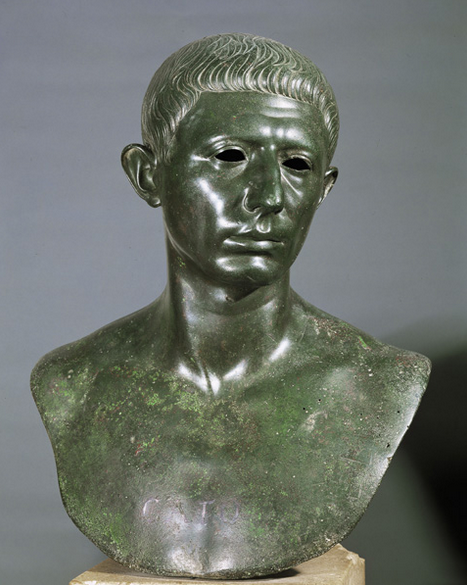







A rather telling example of the futility of dutiful adherence to a constitution that everyone one else ignores. Constitutional conservatives take note, Nor can those who admire Cato the younger for his principles deny that none would remember Cato had not Sulla made it possible for him to exist by saving the Republic in his day.
“Ten Catos might have saved the Roman Republic”
Only if they were dictators. Sulla saved the Republic by accumulating the power to do so outside republican norms. In doing so, he showed the Caesars following behind that power rested in loyal armies, not in rules or honors.
Not that it was Sulla’s fault. The blame probably belong to Scipio, all things considered.